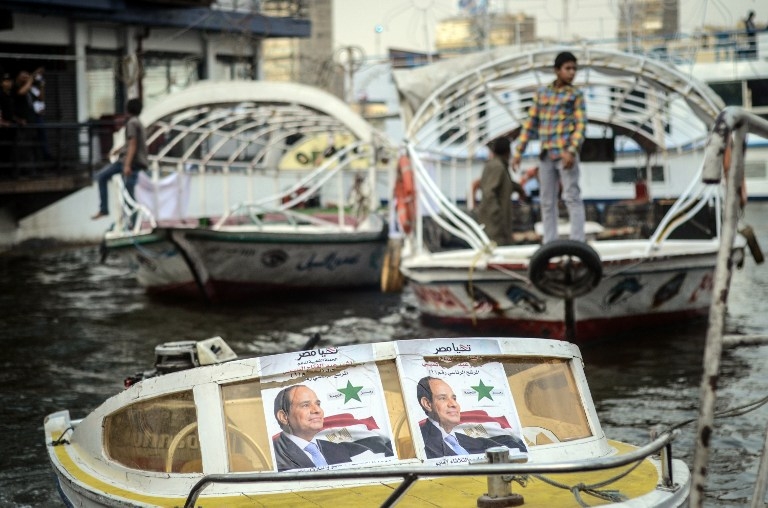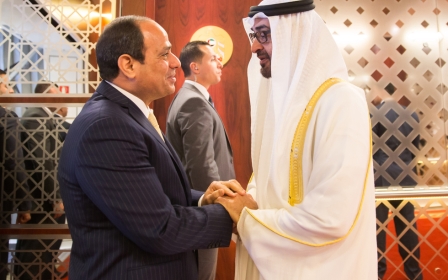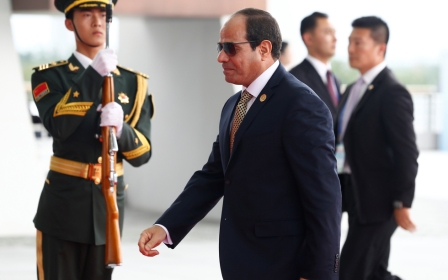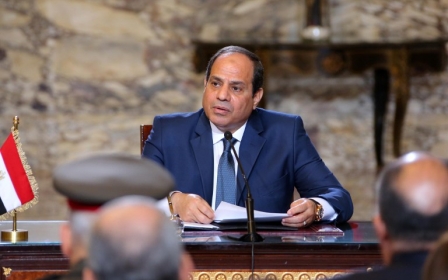Shrink or sink: Egypt's IMF whirlpool

Memory, when it comes to events of magnitude, is rarely hazy. The January 1977 Bread Riots are such a memory marker.
In the mind of a 10-year-old child, there was unknown danger in the air reflected by a smoky Cairo sky after violent clashes. For this child, the Bread Riots, as they would become known, were simply a moment in time when his father disappeared at work for three straight days as a journalist for MENA, the government-run news agency.
For the rest of the world, the “riots" were a thunderous "No" from an Egyptian street, signed in the blood of 80 dead, to the International Monetary Fund (IMF)-dictated, Sadat-approved economic policies. It was a fatal error in judgement that, some believe, may have led to the president’s assassination four years later.
Fast forward 39 years: the child has grown up, Sisi has replaced Sadat and his administration faces life and death choices as another limbo looms between the regime, the people and the IMF.
Just like Sadat before him, Sisi is damned if he does and doomed if he doesn’t. When shrink or sink are your options, you are doing something wrong.
Silent killers
Why is the economy on a cliff’s edge? Start with youth unemployment which has shot up from 29.2 percent in 1991 to 42 percent in 2014 and rising, according to the World Bank. Those figures are nothing short of a subterranean societal bomb.
Economic growth has been "uneven" leading to a staggering official figure of a quarter of Egyptians now living below the poverty line – in other words, living on $1.90 or less each day.
Mix in a hard currency crisis that has seen the dollar outflank the Egyptian pound to the tune of 13 to one in the parallel markets. Inflation, meanwhile, has reached a seven-year high of 14 percent - nothing less than a silent killer.
External debt, which continues to eat away at Egypt’s foreign currency reserves that are down to a dangerous $15bn as of July, has risen during Sisi’s rule from $44.8bn in July 2014 to $53.4bn in January 2016.
At the helm, Sisi recognises the danger and recently said "the country’s future is at stake". Egypt’s top executive is correct, on this occasion.
As of October 2015, alarms began to ring loudly, but few heard.
"The current government will end in the worst economic disaster,” warned Fatema El Asyouty, an Egyptian economic analyst and researcher.
"Rise of the dollar, expanding external debt, unemployment, and unbearably high prices will not be tolerated by people,” she explained.
Indeed. What Egypt has experienced since is exactly what El Asyouty forecast and regime popularity has plummeted. Now the move towards the IMF loan is seen as a necessary course correction but, simultaneously, reflects a desperation that runs counter to a historically contentious IMF-Egypt duality.
Only the potential implosion of the Egyptian economy could drive Sisi into the waiting arms of the IMF. After all, the fund is a complex political economic entity that, while shunning independent regulation of its activities, has cost many a ruler political capital and, sometimes, their very political lives.
But there are two sides to every story and we must examine both the pros and cons on the role of the fund.
The cure?
Naturally, the IMF views itself as an international helping hand. "Cooperation and reconstruction" are the primary roles of the fund as it sees it.
The organisation’s mantle has spanned five periods: the post-World War II, Bretton Woods era of fixed exchange rates; the debt reforms of the 1980s; the restructuring of East European markets post-Soviet Union collapse; and, finally, the current globalisation.
Despite its vision of itself, the IMF can be a nightmare masquerading as a dream. Repeatedly, the men dressed in expensive suits come knocking on the doors of developing nations with the necktie of neoliberal policies.
But with belt-tightening and reshaping of the economic landscape the name of the IMF’s game, it’s a necktie that chokes rather than adorns. Desperate to recoup losses, however, nation states play its deadly game and frequently wind up in even deeper debt.
Sinisterly, these neoliberal policies often aid the debtor nation's elite while tightening the noose around the lower classes. “In many cases, the recipients are worse off today…than before IMF loans began to flow,” as Ana Eiras, senior policy analyst with the Centre for Trade and Economics, points out.
The IMF’s formulaic structural adjustment policies (SAPs) often seek a devaluation of the country’s currency, an instrument already at play in Egypt. The policies intend to bring foreign investors to the table while decreasing export costs, buttressed by the privatisation of national assets.
But some argue that similar tactics undertaken during Sadat’s Infitah (open door) economic policies of the 1970s helped set off the Bread Riots and still cost Egyptians to this day.
In fact, as well-known lawyer and political figure Khaled Ali explained, "Privatisation has seen the dismantling of Egypt’s industrial structure." Much of this damage was done during the Mubarak era. But Mubarak was a highly strategic political player, using a subtle approach. By contrast Sisi’s regime, with neophyte economic advisors who appear to need their own advisors, has and will do major damage within the neoliberal IMF schemata.
Popular dissent
These mechanisms, while deemed necessary by some, are nowhere near as lethal to the regime as the politically explosive removal of the all-important subsidies for a nation that has an official poverty rate of 27.8 percent.
When a nation has over 24 million people living below the poverty line, subsidies are not an economic luxury but a must to keep revolutions at bay. Just like clockwork, demonstrations erupted this past Thursday, mostly by angry mothers demanding children’s formula that they now have difficulty finding in the shops or, when they do find it, find it has doubled in price after the removal of subsidies linked to the proposed fund deal.
In addition to a dearth of hard currency, the industrial wheel has shrunk to tricycle-size as a result of limited foreign investment. Meanwhile Egyptian economic growth, which recovered in 2015 to hit 4.2 percent, is projected to fall to 3.3 percent this year. With the economy teetering and more than $20bn of Gulf aid down the Sisi pipe dream, the nation is in the dreaded vice-like grip of the IMF.
A structural adjustment programme, which is attached to the $12bn IMF loan package, will require that Sisi does what analysts have described as "poor nations lower the living standard of their people". Without the IMF lifeline Sisi may sink.
But with it, Egyptians could suffer the double whammy of skyrocketing inflation and severe price hikes should the projected currency devaluation take place. Most people don’t realise that the projected IMF billions would likely go towards stabilising the disastrous currency market in investor confidence-building measures.
But who is going to trust a Central Bank of Egypt (CBE) that has been bumbling for many months under the unsteady leadership of Tareq Amer? If Egypt’s pro-government parliamentarians recently described Amer as the source of the dollar crisis, how can he be trusted to manage the IMF-prescribed Egyptian pound devaluation?
Many believe Sisi’s ears are open only to "a narrow circle of tycoons". There is little hope, in such a climate, that an IMF package will do anything but increase poverty, foreign debt and potentially throw Egypt into the clutches of veiled economic colonialism.
Explosive combo
There are some who hold out hope that the IMF-Egypt tango will not sink the ship. While acknowledging a "rocky" pairing, Mohamed El Arian, a leading economist and chairman of Obama’s Global Development Council, believes that the IMF package includes potentially sufficient safeguards.
The deal, he argues, "promotes fiscal, monetary, and exchange rate measures aimed at containing financial imbalances…and promotes the strengthening of social welfare programs".
However, even a hopeful analysis of the deal’s potential acknowledges the accusations levelled by critics that say the structural premise of the IMF’s aid packages promote poverty rather than economic health.
Moreover, while reasoned in his argument, Arian neglects to mention that while focusing on safety nets, the fund’s programme does not account for rampant corruption which consistently undermines the most well-intentioned social programmes.
A dictator with a track record of spending untold billions on self-aggrandising projects and a Western economic colossus whose solutions are "one size shrinks all economies" are the short cut to another explosion.
- Amr Khalifa is a freelance journalist and analyst recently published in Ahram Online, Mada Masr, The New Arab, Muftah and Daily News Egypt. You can follow him on Twitter @cairo67unedited.
The views expressed in this article belong to the author and do not necessarily reflect the editorial policy of Middle East Eye.
Photo: A motor boat, moored on the River Nile in Cairo, plastered with images of then leading presidential candidate Abdel Fattah al-Sisi a week before the nation went to the polls in May 2014 (AFP)
This article is available in French on Middle East Eye French edition.
Middle East Eye propose une couverture et une analyse indépendantes et incomparables du Moyen-Orient, de l’Afrique du Nord et d’autres régions du monde. Pour en savoir plus sur la reprise de ce contenu et les frais qui s’appliquent, veuillez remplir ce formulaire [en anglais]. Pour en savoir plus sur MEE, cliquez ici [en anglais].





